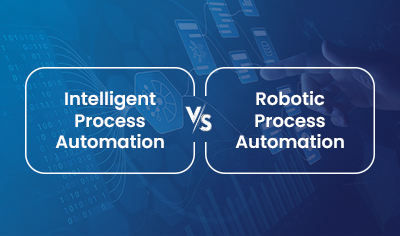Agility, innovation, and efficiency are inseparable factors that allow businesses to differentiate themselves in today’s highly competitive market. As such, intelligent automation has emerged as a transformative force, enabling businesses to unlock new levels of efficiency and automation. This is where UiPath enters the picture. It is a comprehensive Robotic Process Automation (RPA) platform that allows businesses to streamline and optimize processes using software bots. These bots mimic human interaction and promptly address an assortment of customer requests and queries. The resulting responsiveness drives customer satisfaction and business profitability.
The UiPath automation platform comes with a variety of tools like UiPath Studio for automated workflow designing, UiPath Robot for executing automation, UiPath Orchestrator to manage all bots, and UiPath Automation Cloud to implement automation over the cloud. All in all, it is an invaluable tool to add to any business’s tech stack, and we’re about to explore why!
Impact of UiPath Automation on Business Processes
Let’s begin with the benefits that UiPath automation platform has to offer to business processes across different industries. These are:
1. Improved Productivity and Efficiency
UiPath, whether deployed on-premises or through UiPath Cloud RPA, automates repetitive, rule-based processes that are time-consuming, tedious, and more susceptible to human errors. This improves business efficiency and allows human workers to focus on more strategic and value-adding tasks. Since employees are no longer bogged down by low-level, mundane tasks such as data entry, they put more hours back into their day, leading to improved productivity and performance.
2. Enhanced Scalability and Flexibility
Human employees limit business scalability and flexibility. No doubt businesses upscale operations, but it also attracts a proportionate cost. On the other hand, downscaling may cause a loss of talent and erode business reliability as an employer. Fortunately, UiPath Robotic Process Automation is a way out of this balancing act. RPA lends a high degree of business scalability and flexibility allowing the business to perform a wide range of tasks regardless of the demand or resources available. Such enhanced scale and scope gain more traction when one considers that RPA workflows may be duplicated and reprogrammed repeatedly to sustain the entire business environment!
3. Richer Customer Experiences
UiPath enables the automation of customer-centric processes, leading to faster response times and improved service quality. As such, businesses leveraging UiPath intelligent automation cloud ensure a smoother customer experience through rapid and efficient handling of inquiries and transactions. Further, by automating repetitive and complex tasks, cloud RPA reduces the workload of customer service and support teams. As a result, customer-facing employees have more time to focus on complex and crucial customer interactions, thereby improving service quality and customer satisfaction.
4. Cost Savings and Profitability
UiPath, especially when deployed on the cloud, reduces operational costs by automating repetitive tasks, minimizing errors, and optimizing resource utilization. Cloud RPA solutions drive business profitability by lowering costs, reducing downtime, and eliminating the need for labor. This leads to significant savings for businesses.
5. Enhanced Accuracy
UiPath RPA bots do not make mistakes like humans do. They follow instructions precisely, which leads to higher accuracy in tasks such as data processing and reporting. This reliability helps businesses maintain compliance with regulations and avoid costly errors.
6. Integration with Existing Systems
UiPath offers smooth integration with several applications and systems. This means that businesses don’t have to make major changes in their existing IT setup to benefit from intelligent automation.
Identifying RPA Opportunities with UiPath
Real-World Use Cases of UiPath Across Industries
Here’s an overview of how different industries use UiPath to achieve their automation goals:
- Finance: With UiPath Robotic Process Automation, mundane tasks in finance are automated so that the staff can focus on high-value activities. It is typically used for processing invoices, generating financial reports, and automating account reconciliation processes.
- Human Resources (HR): UiPath Cloud RPA transforms HR operations and elevates employee experiences. Right from employee onboarding to attendance and time monitoring, and leave management, it streamlines various facets of HR operations.
- Retail: UiPath uses bots to handle repetitive processes such as inventory management and supply planning to streamline operations and improve efficiency for retail businesses.
- Banking: From automating account opening processes and Know Your Customer (KYC) checks to revolutionizing customer communication, UiPath automation in banking accelerates internal workflows, enhances compliance, and improves customer service in the banking sector.
- Education: Educational institutions implement UiPath to automate the process of enrolling students, managing their records, and handling everyday office work.
- Logistics: With the help of UiPath, companies automate tasks like billing, keeping track of stock, and monitoring shipments. This improves visibility and reduces delays in the supply chain.
- Government: Government agencies use UiPath to automate data processing for public services, claims handling, and compliance checks. This improves efficiency in delivering services to citizens.
Uncover Untapped Potential Across Industries with RPA Use Cases
Best Practices for UiPath Robotic Process Automation Implementation
Implementing UiPath Cloud RPA involves strategic and intentional planning to ensure that the automated setup successfully kicks off. The following is a high-level view of the different stages involved:
I. Identify Suitable Processes: Start by identifying processes that are well-suited for automation. Rule-based, repetitive, and time-consuming processes are ideal for automation.
II. Conduct a Process Analysis: Assess the suitable processes to understand the scope, volume, and potential for UiPath automation. Thereafter, make a list of the processes to prioritize when implementing UiPath services.
III. Involve the Stakeholders: Identify and involve the key stakeholders across different departments. Make sure to get buy-ins from the C-suite, IT, and end-users before embarking on the UiPath cloud RPA implementation journey.
IV. Choose the Right Deployment: Based on your business needs, select the right UiPath edition and deployment option. For more flexibility and scalability, you may consider UiPath Cloud RPA. Collaborate with UiPath implementation partners to ensure a seamless integration with your existing systems.
V. Start Small: Begin with a pilot project to test UiPath RPA on a smaller scale. This allows you to identify challenges and make adjustments before rolling out larger initiatives.
VI. Ensure Data Security: Implement strong security measures to protect sensitive data handled by UiPath RPA bots. Use encryption and access controls to safeguard information.
VII. Establish Governance: Set clear instructions for how UiPath RPA will be used. This includes outlining who is responsible for what and ensuring everyone follows the regulations.
VIII. Monitor Performance: Regularly check on the performance of UiPath bots. Use metrics to measure success and find areas that need improvement.
IX. Provide Training: Offer training sessions for team members on how to use UiPath RPA tools effectively. This ensures everyone is comfortable with the new technology.
X. Plan for Scaling: As you see success, think about how to expand UiPath RPA across other processes in your organization. Develop a strategy for scaling up your UiPath intelligent automation efforts efficiently.
Conclusion
UiPath automation platform unlocks a world of value for businesses of all shapes and sizes. Use the platform to implement automation at scale to make your organization more resilient and adaptive. These characteristics allow businesses to streamline workflows iteratively, enhance productivity and customer-centricity, reduce operational costs, and win customer favor. With such tangible and promising benefits, UiPath services are all set to transform the business landscape!
Case in Focus
The client, a large-scale manufacturing company headquartered in Dubai, was struggling with payment processing and management. Manual payment processing hampered operational efficiency. To overcome this challenge, we implemented an automated solution based on UiPath Document Understanding. The solution demonstrated over 95% accuracy when reading invoice-related documents and enabled the client to process invoices up to 75% faster. Read the detailed case study to learn how our implementation of the automated solution benefited the client.







